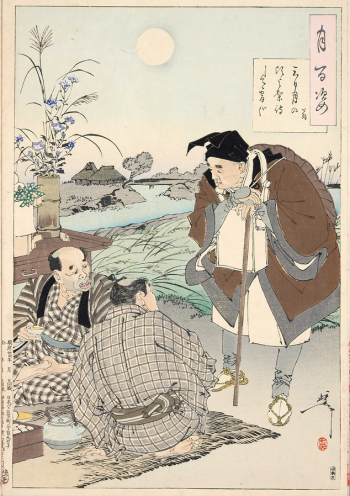The Penguin Book of Haiku

As a person who likes Japan, likes literature, and likes what he’s read of the combination of those two, I want to like haiku. However, it’s never really appealed to me. In my experience, five-line tanka are about as short as a poem can be and still feel like it has some substance to it, and even that takes a patient sort of reading to appreciate. I also hadn’t read all that many of them though and didn’t know much about the context in which they were written, so I hoped that reading The Penguin Book of Haiku, with its large sample size accompanied by an extensive introduction and some commentary, would help me to at least appreciate if not enjoy the form.
Conclusion: I still dislike haiku, but now I have more reasons to dislike them.
First, a little context. Editor and translator Adam Kern includes a rather long introduction, most of which is worth reading but the main point is that before the early Twentieth Century haiku weren’t written as short, standalone poems. Rather, it was more of a game played with a group of people. You begin with a challenge verse, and participants compose, on the spot, verses in answer to the challenge and to each other. Haiku contests, in which a challenge verse is published and the best responses win a prize, were also extremely popular. This form of haiku, as essentially a word game, does sound fun and, though you certainly did have the meditative, serious haiku we typically associate with the form today, many of them were comedic and in their original context probably were quite funny. To give Penguin’s collection credit, this context is important to understanding haiku and reading these poems alongside the challenge they responded to makes them far more intelligible than the more common format of printing them as standalone poems. Unfortunately, I still can’t get past two problems.
One is the same reservation I’ve always had, which is that they’re insubstantial. The first few entries in the “Washbasin” series, which introduces the book, should suffice as an example:
The washbasin’s drip-dripping gives way to crickets chirping. [by Bonchou]
with oil burning low an early-to-bed autumn [by Bashou]
fresh new straw mats having just been installed, in the moonlight! [by Yasui]
here’s wishing a millennium of sundries gathered - New Year’s feast [by Bashou]
Kern adds some commentary, but even so, there frankly isn’t much here. In the Hyakunin Isshu, the poems are short and rely heavily on the reader savouring a given poem’s predominant image, but here all you have is a phrase and the reader ends up doing most of the work trying to get something out of them. Now, given haiku’s popularity, many readers seem to enjoy that, and I suppose if you’re using the more serious poems as a sort of meditation, I can appreciate that. I open to the possibility that I’m just missing something. Personally, I prefer poetry that stands more on its own.
In any case, the other problem is the many, many puerile haiku. An example Kern uses in the introduction to illustrate low-brow haiku is the response to “However grim, / It was also funny,” by Soukan Yamazaki, “Even while / my father lay dying / farts kept ripping!”
Is it funny? Well, sure. Is it worth writing down and preserving? Frankly, no. Gross, irreverent jokes may be funny in their immediate context, but they aren’t something I particularly want to read. Kern also includes obscene haiku, sometimes with accompanying Edo-era illustrations. He says in the introduction that he includes them to give an accurate idea of what haiku was like, and to emphasise that the Japanese of this era were human, for better and worse. That’s perfectly defensible, of course, but it still doesn’t make me interested in reading someone’s old porn stash.
So, would I recommend The Penguin Book of Haiku? Well, if you want an opportunity to learn about the form, there are a lot of them here with a solid and substantial introduction. If you don’t like haiku, though, it won’t change your mind. For that matter, if you do like haiku the way it’s most often presented, it might even change your mind for the worse. I went into the book expecting short scenes of cherry blossoms and frogs jumping into ponds, instead I got short scenes of farting at wakes and masturbating voyeurs. I suppose that’s the risk you take when you walk into a new literary scene.